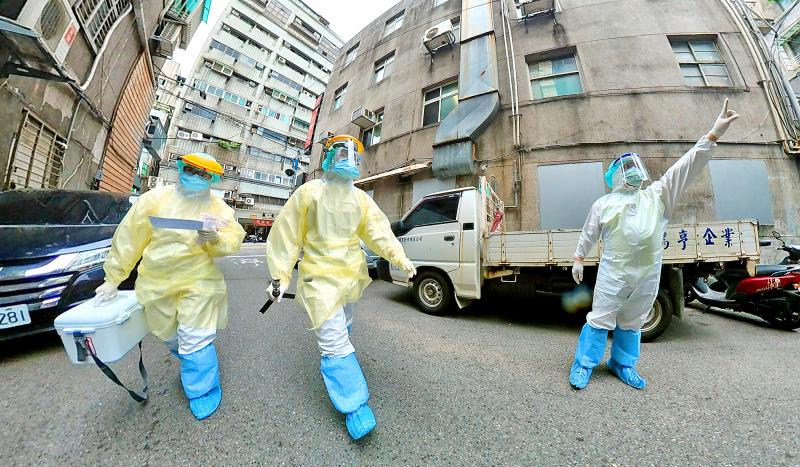Local COVID-19 cases are expected to continue rising in the upcoming week, the Central Epidemic Command Center (CECC) said yesterday, as it reported a record-high 85,310 new domestic cases and 41 deaths.
Daily case numbers had remained in the 60,000s for the past six days before surging about 30 percent yesterday, said Minister of Health and Welfare Chen Shih-chung (陳時中), who heads the center.
Centers for Disease Control (CDC) Deputy Director-General Philip Lo (羅一鈞), deputy head of the CECC’s medical response division, said the number of polymerase chain reaction (PCR) tests conducted on Tuesday also marked a record-high of 112,915, with a positivity rate of 66.7 percent.

Photo courtesy of New Taipei City Social Welfare Department via CNA
As many large testing stations have been set up in northern Taiwan in the past couple of days, while cases in central and southern Taiwan are also increasing, daily case numbers are expected to peak in the upcoming week, he said, urging people to take precautions.
The CECC also reported 153 new moderate cases and 30 new severe cases yesterday, and the condition of 11 previously reported moderate cases worsened to become severe cases, Chen said.
Of the 41 deaths reported, 40 had underlying health conditions and one is a two-year-old in Keelung, whose condition has been widely reported by local media, Lo said.
The boy did not have any chronic illness, but had acute encephalitis and multiple organ failure after he was infected with COVID-19, Lo said.
Twenty of the deaths were elderly people aged 80 or older, Lo said, adding that 20 cases (48.7 percent) were unvaccinated, and 28 cases (68.2 percent) did not receive a booster dose of vaccine.
Asked why infected newborns younger than three months who have a fever should be hospitalized under the revised COVID-19 triaging criteria issued on Tuesday, Lo said that newborns have an immature immune system, so when they develop a fever, they could turn into emergency cases that need pediatric care.
A fever in newborns can be a sign of sepsis and would need immediate attention, he said, adding that the criteria were set after discussions with medical societies.
Asked about media reports that some infected healthcare workers have been asked to take care of infected patients, Lo said that between April 1 and Tuesday, a total of 240 infected healthcare workers had been asked to return to work early before their scheduled release from isolation.
They included eight people in three healthcare facilities, mostly at specialized departments, such as the pediatric respiratory care ward; and 232 people in 35 long-term care facilities, mostly long-term care providers, he said.
Infected healthcare workers can only be asked to return to work early with their consent, and they must be either asymptomatic or mildly symptomatic, he said, adding that their return must be approved by the head of the communicable disease control medical network in their region.

Taiwan is gearing up to celebrate the New Year at events across the country, headlined by the annual countdown and Taipei 101 fireworks display at midnight. Many of the events are to be livesteamed online. See below for lineups and links: Taipei Taipei’s New Year’s Party 2026 is to begin at 7pm and run until 1am, with the theme “Sailing to the Future.” South Korean girl group KARA is headlining the concert at Taipei City Hall Plaza, with additional performances by Amber An (安心亞), Nick Chou (周湯豪), hip-hop trio Nine One One (玖壹壹), Bii (畢書盡), girl group Genblue (幻藍小熊) and more. The festivities are to

Auckland rang in 2026 with a downtown fireworks display launched from New Zealand’s tallest structure, Sky Tower, making it the first major city to greet the new year at a celebration dampened by rain, while crowds in Taipei braved the elements to watch Taipei 101’s display. South Pacific countries are the first to bid farewell to 2025. Clocks struck midnight in Auckland, with a population of 1.7 million, 18 hours before the famous ball was to drop in New York’s Times Square. The five-minute display involved 3,500 fireworks launched from the 240m Sky Tower. Smaller community events were canceled across New Zealand’s

‘IRRESPONSIBLE’: Beijing’s constant disruption of the ‘status quo’ in the Taiwan Strait has damaged peace, stability and security in the Indo-Pacific region, MOFA said The Presidential Office yesterday condemned China’s launch of another military drill around Taiwan, saying such actions are a “unilateral provocation” that destabilizes regional peace and stability. China should immediately stop the irresponsible and provocative actions, Presidential Office spokeswoman Karen Kuo (郭雅慧) said, after the Chinese People’s Liberation Army (PLA) yesterday announced the start of a new round of joint exercises around Taiwan by the army, navy and air force, which it said were approaching “from different directions.” Code-named “Justice Mission 2025,” the exercises would be conducted in the Taiwan Strait and in areas north, southwest, southeast and east of Taiwan

UNDER WAY: The contract for advanced sensor systems would be fulfilled in Florida, and is expected to be completed by June 2031, the Pentagon said Lockheed Martin has been given a contract involving foreign military sales to Taiwan to meet what Washington calls “an urgent operational need” of Taiwan’s air force, the Pentagon said on Wednesday. The contract has a ceiling value of US$328.5 million, with US$157.3 million in foreign military sales funds obligated at the time of award, the Pentagon said in a statement. “This contract provides for the procurement and delivery of 55 Infrared Search and Track Legion Enhanced Sensor Pods, processors, pod containers and processor containers required to meet the urgent operational need of the Taiwan air force,” it said. The contract’s work would be